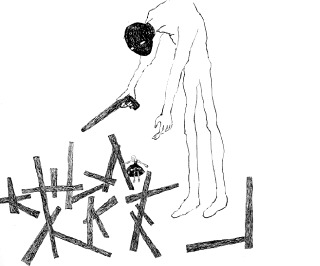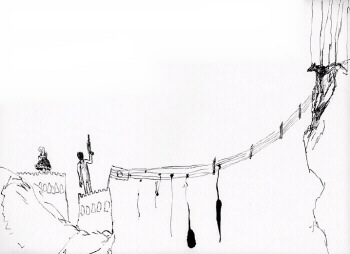 February 06
February 06
What Happens Next?
Robbie Gringras
You see, it all begins with Mohammed.
Not the prophet...
The baker.
Mohammed the baker. This guy that I met...
What happens next?
It's a question any storyteller is desperate for the audience to be asking itself. But at the same time it's a question that I as a writer and performer ask myself before, during, and after the creation of every new show. After the performance – the next day, next week, next year – how will my show have affected the behavior of the audience, its beliefs, the way it lives? What happens next? After I have performed this show, what kind of job offers am I likely to receive, what festival will invite me, what theatre will I play, what might my income be? What happens next?

I have always romanticized those artists who don't play the "what happens next" game – those true artists who just stick with their own internal integrity. Their show may or may not strike a political chord, change lives, make a million bucks – but it's a case of luck or cosmic positioning, and not as a result of a conscious effort on the part of the artist. And hey, if the artist ends up poor and unappreciated, that's just the way it goes. At least they are true to their vision.
When I sat down to write "The Situation Comedy" that I realized that all of the shows I'd created over my sixteen years in the business had always been influenced by the ”what happens next" consideration. Recently, I had toured extensively with a play that challenged the role of women in Judaism through the Talmudic tragedy of Bruriah as well as a solo show that had exposed the pain and violence of Israel's secular-religious strife. It wasn't as if my past shows had always been cheerful. It wasn't as if I was the community's yes-man. "The Situation Comedy," though, was something else. Writing it taught me what it really meant to be "true" to a vision, and to hell with the consequences.
To be honest, I'd been trying to avoid writing a show about the Israel-Palestine conflict for two years. "The Situation" as it had come to be known - the oppression of Palestinians, the suicide bombings, the pain and terror of everyday life in our region – was a subject that kept screaming in my veins, and that I tried desperately to dodge. After ten years of living in Israel I had nothing wise to teach, I certainly had nothing commercial to sell – all I saw when I looked into the topic was a howling black hole that gave me the shivers. But I couldn't escape it.
When I started writing, we in Israel had just lived through a crazy month, leading up to the violence of Pesach 2002. Over 100 people had been blown up in suicide bombings throughout the country, culminating in the blood-curdling attack on a communal Seder at the Hotel Park in Netanya. It was a terrible time. From the small to the large, from the way in which one phoned home more often when in town, took more taxis than buses, said a warmer thank you to security guards, our daily lives had changed.
It had become impossible even to mourn bombing victims properly, since one knew that the next attack was following fast around the corner. The radio stations had run out of sad songs to play every other day, as we Israelis tuned in every half-hour for our death-fix of the news. And more and more we found ourselves readjusting the circle of our existence, adapting sophisticated economic jargon to our emotional state: "How am I? Macro or micro? On the micro level, the kids are fine…"

The BBC World Service once asked me whether I had begun writing the show for "therapeutic" reasons. It was only in answering that I realized my purposes had perhaps been, if anything, anti-therapeutic. I was driven to create the show not in order to process the pain, nor necessarily to understand it. I had sat down at the computer in order to try to feel the pain. The only way to survive day-to-day life in Israel had seemed to be to muffle the cries. In our house at least – and I know we weren't alone – we'd begun turning off the TV with news of bombings. We'd stopped listening to the broadcasts of choked eulogies by friends and families of the deceased. The only way to stay alive, it seemed, was to work very hard at ignoring the death all around. It had begun to suffocate me. Not out of masochism, but out of respect for the victims and their loved ones, I needed to delve into the pain.
And so for the first time in my professional life I found myself beginning to write with the brakes off. Like driving down a winding mountain road (we have lots of these where I live in the Galilee, so the image kept cropping up) with your foot only on the gas. Exhilarating, powerful, and somewhat suicidal. I began to create a show that demanded loyalty only to my sick screaming vision of a one-man tragic comedy about a suicide bombing.
I was looking for the laughter of shame. What if a clown tried to imagine how a baker might become a suicide bomber? What if this innocent baker has his house demolished – by accident?
YOSSI: [clambering over the rubble] Hold it right there, terrorist!
MOHAMMED: But I’m not a terrorist. I’m a baker.
YOSSI: Says here you’re a terrorist.
MOHAMMED: Noooo…Next door. Next door! Mohammed the Terrorist? Next door. I’m Mohammed the Baker. ..You just knocked my house down…
YOSSI: Ooops. Sorry about that...
CLOWN NARRATOR: And then the next morning, Mohammed receives a letter. Official Army notepaper:" “Dear Mohammed the Baker. We the Israeli Army would like to apologize for the accidental demolition of your home. We are terribly sorry, and it won’t happen again…”
Could we laugh at that? Could our laughter express our shame, or would it deny it?
I was looking for the laughter of pain. I envisioned a clown telling the tale of the bombing itself: of how Mohammed the Baker, explosives belt strapped around his waist, tries to get on a crammed bus. He doesn’t take into account the traditional push and shove of Israelis standing in line.
CLOWN NARRATOR: He puts his foot up onto the crammed bus but the driver yells out, “Full up! Fuck off!” [presses button] The doors close [whoosh!], smacking Mohammed [smack!] on the forehead, and he falls, cracking his head on the sidewalk [crack!]. Mohammed is out cold. But the driver notices! “Casualty in the field!” he cries, and jumps out of the bus to look after Mohammed. Several other people get out of the bus because they once met a doctor… Others jump off the bus just to tell the others that they’re doing it wrong! And all the rest of the passengers come out, but only to watch… So when Mohammed begins to come round he finds himself entirely surrounded by over 50 well-meaning, queue-hating Israelis asking him if it hurts, and beginning. To loosen. His clothing…
QUEUE-HATING ISRAELI: Oh my God, it’s an explosives belt. It’s a terrorist!
They run away, and Mohammed runs after them. I wondered how I might turn the whole scene into a Benny Hill sketch, together with silly music and a cartoon chase. They run round in circles, Mohammed pointing and giving chase, and a whole string of characters run from him – the fat man, the sweating man, the juggler, the elephant, the giraffe…
I imagined it all funny. Terribly, painfully, funny. I imagined a clown trapped by his own desire to make others laugh, destroyed by his search for the philosopher's stone that might conjure humor from horror. Could we laugh at him? Could the laughter be an expression of our pain, or might it belittle the pain?
These were questions I knew would only play out in a theatre, in front of an audience. I tried not to ask myself what might happen next. I tried not to imagine the damage the show might do my career, the enemies I might make, the money I might lose, and the emotional wreck I might become. If I had, I might never have done the show.








